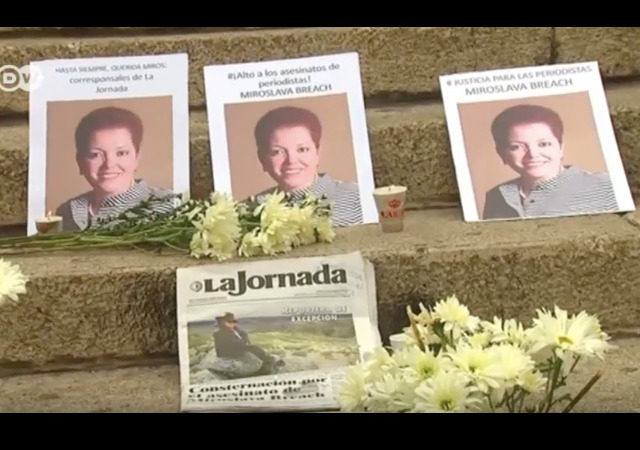Journalists Murdered by Cartels in Mexico Forcing Newspaper to Close Shop

Journalists have faced escalating danger in recent months due to the cartels. Numerous murders have forced one news outlet to shut down production entirely.
El Norte De Cd. Juarez’s director, Oscar Cantu Murgia, announced the shut down on Sunday after the murder of Miroslava Breach, a collaborator for the paper, in the Mexican state of Chihuahua:
“On this day, esteemed reader, I address you to report that I have made the decision to close this newspaper due to the fact that, among other things, there are neither the guarantees nor the security to exercise critical, counterbalance journalism,” wrote Norte’s owner, Oscar A. Cantú Murguía.
Murdered Journalists
Gunmen shot Miroslava Breach eight times in her car while she was outside of her house last month. One of her three children sat in the car with her. “Being a tattletale” was found scribbled on a piece of cardboard at the scene.
Breach recently uncovered connections “between government officials and the Juarez Cartel.” These investigations included “the mother-in-law of a cartel boss trying to run for mayor, while others looked into how the former governor of that state protected certain criminal organizations.”
In Veracruz, gunmen killed Ricardo Monlui Cabrera a few days before Breach’s murder. The murderers shot him as he left breakfast with his wife. Unlike many journalists, Cabrera never received any threats and did not know he was in danger.
Journalist Cecilio Pineda Birto lost her life on March 2 at a carwash in the state of Guerrero.
Gunmen wounded editorial director, Armando Arrieta Granados, in Veracruz last week. He remains in stable condition.
Newspaper Closure
Breach’s murder became the last straw for Murgia:
“Everything in life has a beginning and an end, a price to pay,” Cantú said in the letter, which was also published online. “And if this is life, I am not prepared for any more of my collaborators to pay it, nor with my own person.”The tragic news of Breach’s death made Cantú angry, tired and “fed up,” he said. Over the course of its 27 years in publication, the newspaper’s reporters have been in “the line of fire” and have faced a number of risks as a result of their coverage, risks that are heightened because of the newspaper’s proximity to the border, Cantú said. But with the death of Breach, the realities of the profession have hit closer to home than ever before.“For me, a free press is a pillar of democracy,” Cantú said. “If I can no longer do the type of journalism that I want to do … I cannot accept it anymore. Enough.”
The newspaper had been in production for 27 years and the closing will result in the loss of 150 jobs. Those in the area expressed sadness for the loss, but mostly sided with Cantu:
“The memory of their struggle will not be erased,” the reader wrote. “Citizens will always be grateful for their valuable dedication to make this world a better place for our children.”
Reporter and photographer Herika Martinez tweeted this:
Translation: Today the printing of newspaper North of #CiudadJuarez was stopped. The paper is blank. Today a part of journalism died in Juarez.
Rights Groups Speak Out for Journalists
Breitbart Texas spoke with those in the Network of Journalists in Mexico:
While Breach’s murder has received minimal attention from international media, journalists in Mexico that spoke with Breitbart Texas revealed that they are deeply concerned by the ongoing wave of violence targeting them. As Breitbart Texas has reported, Breach’s murder is the third of its kind this year. In recent years, various freedom of the press organizations such as Reporters Without Borders and Article 19 have labeled Mexico as one of the most dangerous places to work in.Breitbart Texas spoke with representatives of the Network of Journalists in Mexico’s Northeast who expressed their concern and anger at the impunity with which journalism continues to be silenced in Mexico. The organization continues to call on the Mexican government to investigate and punish not only the triggermen, but also those who ordered the various murders.
Unfortunately, this is nothing new. The Committee to Protect Journalists (CPJ) said that “38 journalists have been killed in Mexico since 1992 for motives confirmed as related to their work.” The group also said that fifty journalists died during that same period, but for unknown reasons:
“Mexico is clearly going through a deep, full-blown freedom of expression crisis,” Carlos Lauria, senior program coordinator for the Americas at CPJ, told the Associated Press. “It’s affecting Mexicans, not only journalists, because the fact that a newspaper closes is depriving people of information that they need in order to take informed decisions.”
CLICK HERE FOR FULL VERSION OF THIS STORY